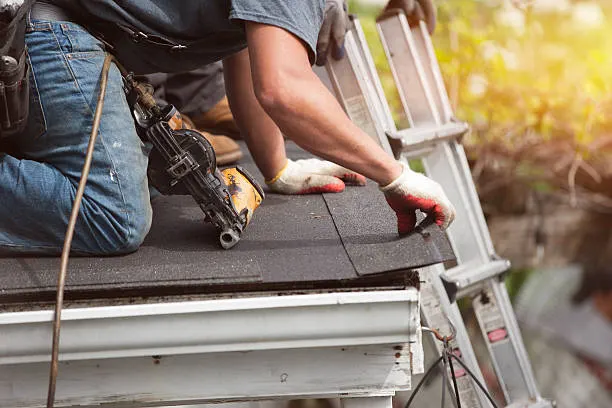How to Replace a Flat Roof on a House? Flat roofs are a popular choice for homes in many parts of the United States. They are relatively easy to maintain and can provide a long lifespan with proper care. However, even the best flat roofs will eventually need to be replaced.
If you are considering replacing your flat roof, there are a few things you should know. First, it is important to choose the right type of roofing material. There are many different types of flat roof materials available, each with its own advantages and disadvantages.

Choosing the Right Roofing Material
The most common types of flat roof materials include:
- EPDM: EPDM is a type of rubber roofing material that is known for its durability and longevity. It is also relatively easy to install.
- TPO: TPO is another type of rubber roofing material that is similar to EPDM. It is also durable and long-lasting, but it can be more expensive than EPDM.
- ModBit: ModBit is a type of asphalt roofing material that is applied in sheets. It is relatively inexpensive and easy to install, but it is not as durable as EPDM or TPO.
The best type of roofing material for your home will depend on a number of factors, including your budget, the climate in your area, and your personal preferences.
Preparing the Roof
The first step in replacing a flat roof is to prepare the roof for the new material. This involves removing the old roofing material, repairing any damage to the deck, and cleaning the roof.
Removing the Old Roofing Material
To remove the old roofing material, you will need to use a variety of tools, including a hammer, crowbar, and saw. Be careful not to damage the deck when removing the old material.
If the old roofing material is in good condition, you can reuse it. However, if the material is damaged or deteriorated, you will need to dispose of it properly.
Repairing the Deck
Once the old roofing material is removed, you should inspect the deck for any damage. If there is any damage, you will need to repair it before installing the new material.
Common deck repairs include:
- Patching holes or cracks
- Replacing damaged boards
- Applying a layer of sealant
Cleaning the Roof
Finally, you should clean the roof to remove any debris or dirt. This will help to ensure that the new material adheres properly.
You can clean the roof with a pressure washer or a broom. Be sure to wear safety goggles and gloves when cleaning the roof.
Installing the New Roofing Material
Once the roof is prepared, you can begin installing the new roofing material. The specific steps involved will vary depending on the type of roofing material you are using.
EPDM and TPO Roofing
To install EPDM or TPO roofing, you will need to lay the material down on the roof and then weld or glue it in place.
The welding process is used to create a strong, watertight bond between the roofing material and the deck. The gluing process is a simpler alternative, but it is not as durable as welding.
ModBit Roofing
To install ModBit roofing, you will need to apply the material in sheets, overlapping each sheet by at least 6 inches.
The sheets are applied to the roof using a torch. The heat from the torch melts the asphalt in the sheets, creating a strong, watertight bond.
Flashing All Penetrations
Once the new roofing material is in place, you will need to flash all penetrations, such as vents, pipes, and skylights. Flashing helps to prevent water from leaking around these penetrations.
The type of flashing you need will depend on the type of roofing material you are using.
Sealing the Edges
The final step is to seal the edges of the roofing material. This will help to prevent water from leaking underneath the material.
To seal the edges, you can use a variety of materials, such as caulk, mastic, or sealant tape.
Tips for Replacing a Flat Roof
- If you are not comfortable working at heights, you should hire a professional to replace your flat roof.
- Be sure to follow the manufacturer’s instructions when installing the new roofing material.
- Get multiple estimates from different contractors before making a decision.
Conclusion
Replacing a flat roof can be a challenging project, but it is important to follow the steps involved carefully to ensure a successful outcome. By following the tips in this article, you can replace your flat roof.



Leave a Reply